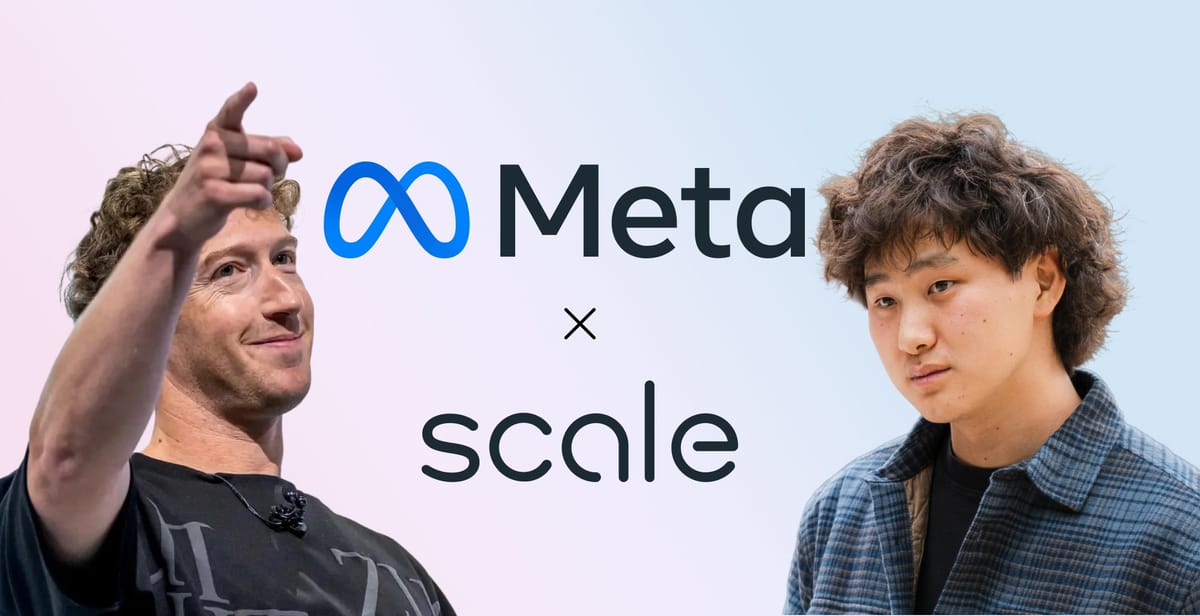Mark Zuckerberg's frustration with Meta's AI efforts just got expensive. The company has finalized a massive $14.3 billion investment for a 49% stake in Scale AI, the data-labeling startup that's been quietly powering the AI revolution from behind the scenes. More importantly, the deal brings Scale's 28-year-old CEO Alexandr Wang directly into Meta's fold to lead a secretive new lab focused on building "superintelligence."
The move, announced late Thursday, values Scale AI at $29 billion and represents one of 2025's biggest tech acquisitions. Wang will report directly to Zuckerberg and spearhead Meta's most ambitious AI project yet — developing artificial intelligence that exceeds human capabilities across multiple domains.
Key Points:
- Meta pays $14.3B for 49% of Scale AI, valuing the data company at $29B in one of the year's largest tech deals
- Scale AI CEO Alexandr Wang joins Meta to lead new "superintelligence" lab reporting directly to Mark Zuckerberg
- Former Uber Eats founder Jason Droege becomes Scale's interim CEO as company remains independent despite Meta's major stake
It's a desperate but calculated gamble. Meta has been hemorrhaging AI talent to competitors and struggling with delays to its flagship Llama 4 model. Reportedly, Zuckerberg has been personally recruiting from his homes in Lake Tahoe and Palo Alto, offering seven- to nine-figure compensation packages to lure top researchers from OpenAI and Google. Now he's doubled down by essentially buying one of the AI industry's most critical infrastructure companies and its young founder.
Scale AI isn't a household name, but it's the engine of modern LLM systems. The San Francisco company provides the massive amounts of labeled training data that power everything from ChatGPT to autonomous vehicles. Think of it as the oil refinery of the AI boom — taking raw data and turning it into the high-quality fuel that makes AI models work.
Wang co-founded Scale in 2016 after dropping out of MIT at 19, initially focusing on data for self-driving cars. But as the generative AI wave exploded, Scale pivoted to become the go-to provider for training large language models. The company uses a combination of software and a global workforce of over 200,000 contractors to label text, images, video, and audio data with the precision AI models need to learn.
Their client list reads like a who's who of AI: OpenAI, Microsoft, Meta, Google, and the U.S. Department of Defense. Scale has been working with OpenAI since 2019, helping train the models that eventually became ChatGPT. They've also secured lucrative government contracts, including a $249 million deal with the Pentagon.
Wang himself became the world's youngest self-made billionaire at 24, though his net worth fluctuated with Scale's private valuations. Born to Chinese immigrant physicists in Los Alamos, New Mexico, he's cultivated an image as both a tech prodigy and a national security hawk, frequently briefing lawmakers about AI competition with China.
Meta has been struggling to keep pace in the AI arms race despite massive investments — the company plans to spend up to $65 billion on AI infrastructure in 2025 alone. Their latest flagship model, codenamed "Behemoth," has been repeatedly delayed due to concerns about its performance improvements. Meanwhile, startups like OpenAI and Anthropic continue to dominate headlines and mindshare.
Enter Wang's new "superintelligence" lab. The goal is audacious: developing AGI that can match or exceed human performance across a wide range of tasks, then push beyond to true superintelligence. It's the kind of moonshot that sounds like science fiction but represents the ultimate prize in today's AI race.
Meta spokesperson Ashley Zandy says the company "will share more about this effort and the great people joining this team in the coming weeks." Translation: more big moves are coming.
For Scale, the deal provides massive financial backing while maintaining independence. Jason Droege, who joined as Chief Strategy Officer in September 2024, steps up as interim CEO. Droege brings serious credentials — he founded Uber Eats and built it into a $19 billion business before moving to venture capital firm Benchmark. The company will distribute significant proceeds to shareholders while using Meta's investment to accelerate growth.
But this deal is about more than money. It's about data supremacy in an industry where information is power. Scale sits at a unique chokepoint in the AI ecosystem, controlling access to the high-quality training data that every major AI company desperately needs. By securing a major stake and Wang's expertise, Meta is essentially buying insurance against being cut off from this critical resource.
The move also signals how the AI race is evolving from a competition over algorithms to a battle for data and talent. Raw computing power matters, but the real differentiator is access to diverse, high-quality training data and the expertise to use it effectively. Scale has spent eight years perfecting this process, building relationships with domain experts across industries and developing proprietary tools for data curation and model evaluation.
Wang's departure leaves Scale with experienced leadership in Droege, but it also raises questions about the company's future direction. Scale has carefully maintained neutrality, working with competing AI labs and government agencies. With Meta as a major stakeholder and Wang leading Meta's most sensitive AI research, that balance becomes more complex.
The deal reflects broader shifts in the AI landscape. As models become more sophisticated, the bottleneck has moved from computing power to data quality and safety. Scale's SEAL (Safety, Evaluations, and Alignment Lab) has become influential in benchmarking AI model performance and identifying risks — capabilities that become even more critical as AI systems grow more powerful.
For Zuckerberg, this represents the biggest bet yet on his vision of AI-powered everything. He's long argued that AI will transform not just Meta's products but society itself. As for Wang, he will remain on Scale's board and help ensure continuity for existing customers. But his new role at Meta, with direct access to Zuckerberg and virtually unlimited resources, positions him to make good on his prediction that "we should not be data-constrained in getting to GPT-10."

